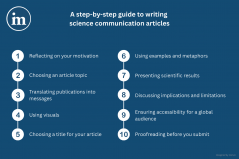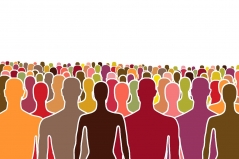Join the In-Mind team: Help us make psychology accessible to everyone!
Join the In-Mind team: Help us make psychology accessible to everyone!
What is In-Mind?
In-Mind is a volunteer-driven project dedicated to sharing psychological research. We give researchers a platform to present their work in an engaging, accessible, and scientifically rigorous way – psychology by scientists, for everyone.
Our journal publishes freely available articles across all areas of psychology. We are the English edition of In-Mind. The journal also publishes in German, French, Dutch, and Italian.
Who are we looking for?
We are seeking active researchers...
/ moreA spoonful of misinformation helps the medicine go viral. How misinformation spreads and who bears the consequences.

keywords:
health misinformation / social media / symptom reporting / online health information seeking / misinformation susceptibility
A spoonful of misinformation helps the medicine go viral. How misinformation spreads and who bears the consequences.
Back to January 2021: you are at home because of the COVID-19 pandemic and decide to scroll through social media for some much-needed distraction. Within seconds, you come across posts about microchips in vaccines, COVID spreading through 5G networks, and President Trump suggesting that injecting disinfectants could be a cure for COVID-19. Social media has become a hotbed of armchair experts, doom-mongers, and conspiracy theorists. You laugh off the misinformation easily, after all, nobody really believes this... Right? / more
A step-by-step guide to writing science communication articles

keywords:
Science communication / Research / In-Mind
A step-by-step guide to writing science communication articles
Effective science communication bridges the gap between science and society. This guide outlines practical strategies for turning psychological research into engaging, accessible articles, including topic selection, structuring the article, and responsible presentation of results. / more
When loving hurts: The pervasiveness of stigma towards consensual non-monogamy

keywords:
consensual non-monogamy / Stigma / Sexual Norms / Relationship Diversity / Prejudice.
When loving hurts: The pervasiveness of stigma towards consensual non-monogamy
Consensual non-monogamy is often seen as immoral, childish, or even harmful. This article reviews how stigma towards consensually non-monogamous relationships is widespread and socially shared, shaping judgments and discrimination against those who love outside monogamous norms. / more
Scrolling through the past: How digital tools change the way we remember

keywords:
autobiographical memory / AMEDIA model / digital media / digital age
Scrolling through the past: How digital tools change the way we remember
We are constantly documenting our lives with digital technologies. But how do these tools, from smartphone camera rolls to wearables and social media platforms, change what and how we remember? In this article, we explore the interplay between memories stored in our minds and the available technological devices. / more
Politics doesn’t define how most people see themselves
Politics doesn’t define how most people see themselves
The social groups to which we belong shape how we see ourselves, but which groups matter most? We show that political parties and ideology are not the first things that come to mind when people think about themselves. Instead, identities like nationality and age are far more central and may help bridge political divides. / more
Minority report: Fact or fiction? Can we actually predict violent behavior?

keywords:
violent behavior prediction / psychology of violence / crime prevention research / risk assessment / predictive technology
Minority report: Fact or fiction? Can we actually predict violent behavior?
More than twenty-four years ago, the film Minority Report offered a visionary glimpse into a future of self-driving cars, facial recognition, and the possibility of predicting crimes before they occur. Some of these technologies have since become reality, but how close are we really to predicting violent behavior? This article reflects on the science of predicting violent behavior, from past to present. / more
Between excellence and well-being: The case of academia

keywords:
Work-Life Balance; Mental Health / Productivity / Work Culture / stress
Between excellence and well-being: The case of academia
Loving your work can be both a privilege and a trap. In academia and beyond, passion and flexibility often turn into pressure and overwork. This article examines the hidden costs of excellence and offers ten science-based strategies to reclaim time, balance, and well-being. / more
Goal achieved? The role of sexual goals in influencing women’s perceptions and attitudes in sexually objectifying relationships

keywords:
sexual objectification / sexual goals / cost-benefit analysis / sexually objectifying interactions
Goal achieved? The role of sexual goals in influencing women’s perceptions and attitudes in sexually objectifying relationships
In this article, we demonstrate that perceived sexual objectification in interpersonal relationships can depend on factors such as the presence of sexual goals and how these goals are aligned between interaction partners. We present studies examining how the activation and alignment of sexual goals shape individuals’ cost-benefit evaluations and their subsequent intentions to continue the interaction. / more
Bisexual invisibility: Perceptions of bisexual people and their representation in the media

keywords:
bisexuality / media / invisibility / psychological well-being
Bisexual invisibility: Perceptions of bisexual people and their representation in the media
Bisexual people often remain “invisible” and are frequently targets of prejudice. This article explores the beliefs people have about bisexuality and examines the role of the media in either reinforcing negative stereotypes or promoting more positive representations. / more


